Students Taking Leadership





The most recent Board of Student Representatives (BSR) meeting opened with a discussion of an issue that would prove to be persistent throughout the morning: the number of missing positions in the student government was so great that the BSR currently requires very high attendance in order to operate. As a result, the meeting was delayed by twenty-three minutes when one member was running late. After the meeting began, the minutes from the previous meeting were approved. These minutes are not public.
After the preamble, the applications for Humanities Senator began. Sonoma Brawley’s application made a case for the value of humanities during a decline in enrollment. She also detailed her background working on innovation in learning spaces. Olivia Fasan followed Brawley with an extensive history in legislative work, history in the hiring committee for the French department, and dual enrollment in Bishop’s and University of Sherbrooke. Brawley was chosen as the candidate after a great deal of deliberation.
From here, Graduate Student Senator candidate elections began. Sandra Aneke quickly found herself elected after her application emphasised an interest in bringing a sense of community to graduate and international students.
After the application process, BU Figure Skating club had an application to reevaluate their budget to get more ice time and funding for skates, requesting $2779. It was decided that this would afford ten pairs of skates with a storage case and their maintenance costs, in a varied enough array of skate sizes to accommodate the growing club. They would also be able to have ice time twice a week until February. This funding is requested largely because of how the cost of skates serves as a barrier for students to join the club and has stifled the
club’s growth.
One concern that SRC President Camilla Rizzi raised was “if the deposit for the skates is $20, what’s to stop people from stealing skates for $20?” She referred to the same thing happening with the graduating hockey team and their hockey jerseys from a previous year. This was resolved by the Skating Club agreeing to document each deposit diligently to retain the skates. The motion carried, and the budget of $2779 was approved.
From here, the BU Volleyball Club requested $1231.47 to get equipment that is competition legal. They wanted funding for a cart, a tripod, higher quality volleyballs, fees for practice shirts, and merchandise. This would assist with each players’ $100 fee to play in the club and allow the recording of games for livestreaming and studying. While this club does not play in a league, they are competing with Cegep teams in hopes of forming a competitive team. The motion to approve the funding passed.
The BU Undergraduate Psychology Society applied for $385 for future wine and cheese catering and decorations. It was noted that there was a rude email sent to SRC executives demanding the money weeks ago. The sum requested at the meeting was approximately double the amount demanded in the email, since there was a catering error when the wine and cheese arrived on Oct. 26 when the real date of the wine and cheese was Nov. 26. As a result, the club wanted to be reimbursed for this scheduling error in addition to their current request. The motion for $385 was approved after noting the usual high attendance at the event, the location being moved to Cleghorn, and the SRC not providing alcohol.
The English Literature Club was approved $77 for a trip to an escape room in an attempt to revitalise the club. Similarly,
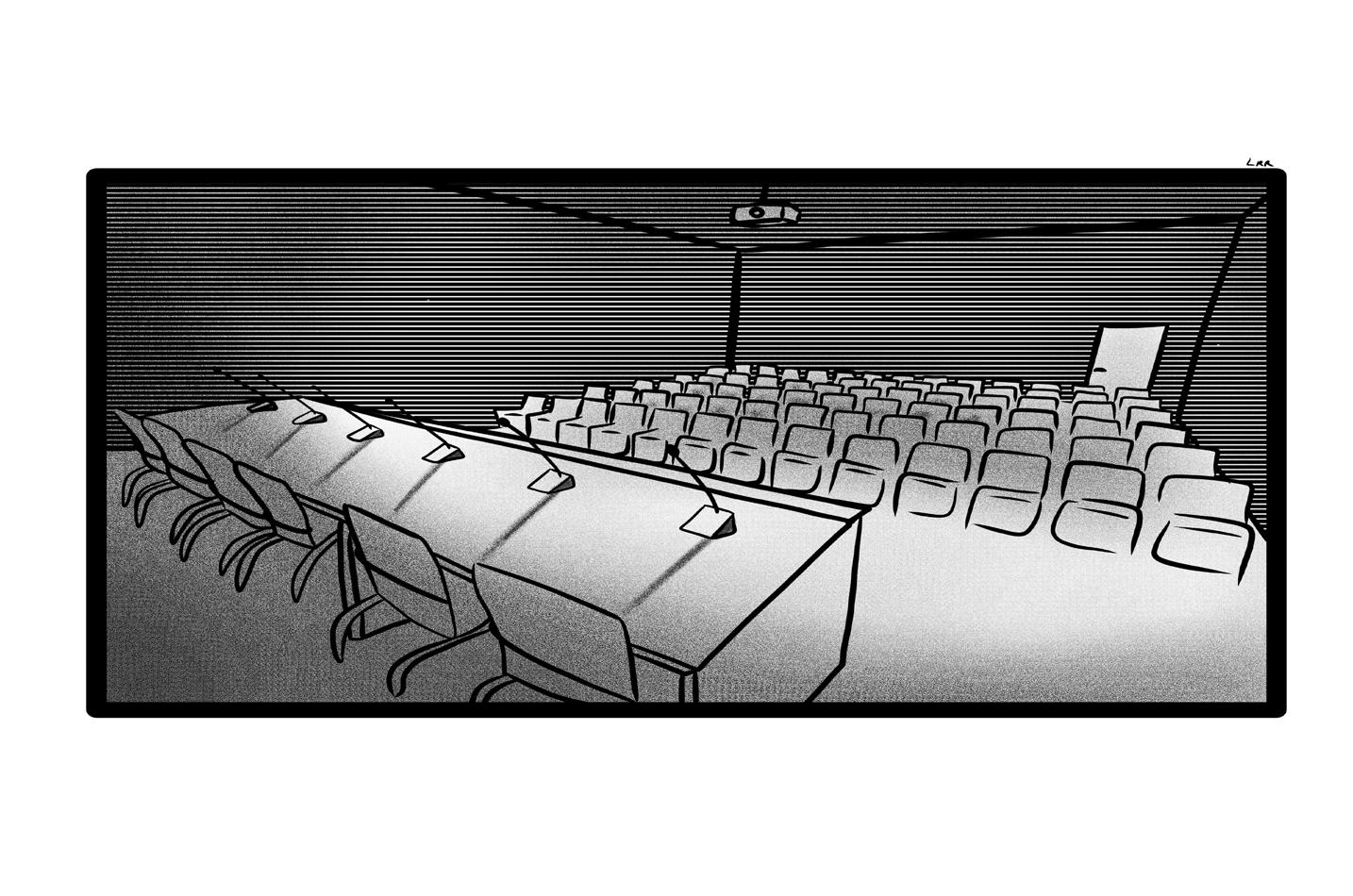
Big Buddies had an insufficient budget, and funding will be reviewed in the coming days.
Education Senator Genevieve Leclair and On-Campus Representative Zoe Ouimette resigned. Advertising for the open positions will include leadership opportunities. Leclair will serve until the end of the semester but will not be able to vote for her replacement due to SRC bylaws. The final request was made for $2000 towards the Jeux du Commerce (JDC) challenge, an event that provides business students an opportunity to build connections. The funding for this project is disputed between the SRC and Williams School of Business. The club had already received some funding from alumni. There was briefly a motion to table this topic until further information was provided, but it failed on the grounds that tabling this topic would negatively affect the timeline of the project. Another motion arose to fund the
project on the condition that Williams School of Business comes through with their own funding. This motion failed. After a brief closed session, a motion to grant $750, as long as it won’t be used on merchandise, was approved.
The meeting, which ran long and ultimately had to be rescheduled, reflects a staffing problem in student government. Student government engagement is low, and as such, motions are being passed inefficiently.
Student Success Week has come and gone, leaving students who stay on campus for Halloween with schoolorganized events to keep themselves busy. This year, BUnited and the SRC organized events from Oct. 26 until Nov. 1. These events have sought to strike a balance between festive activities and scholastic activities in order to address the final weeks of the semester.
On the 26th, BUnited hosted an evening for writing papers and reading effectively. This event was certainly welltimed, since it equips students with the necessary tools to write the essays that are due after the break. Frontloading the scholastic activities makes good use of the remainder of the break.
On the 27th, BUnited hosted a pumpkin painting night while CATS (Career and Transition Services) hosted a small seminar on the application process for graduate school. The pumpkin painting found itself rife with student talent as many wonderful pieces of art emerged from the evening of creation.
On the 28th, BUnited held a spa night that followed the SRC’s trip to a corn maze. The progression of the week brought on more festive events, and these two events worked nicely together. For those who found themselves drained from a day of socialization and walking, a spa night with friends was waiting in the wings. The effective scheduling between these two organizations allowed for both events to be attended by the same people, offering variety and flexibility for all.
On the 29th, BUnited hosted a study workshop while a Halloween costume contest was hosted at the Gait. The study workshop found itself near the end of Student Success Week, thereby offering a smoother transition back into the school routine. For those who wanted a more social evening, the Gait’s Halloween costume contest was a nice way to begin the weekend of festivities.
On the 31st, a Halloween themed hike at Mont Pinacle was held. This continued the variety in events between activities with high and low
socialization and drinking. Where the evening at the Gait was lively and more social, this hike was more focused on conventional Halloween elements.
On the 1st, Griffin House held a free pancake breakfast. While this event is always very popular for those who attend, attendance is often unknown until the day of the event due to a lack of advertising.
On Nov. 3, a vigil was held to remember the message on the bridge in 2021. This will lead into a Take Back the Night march on Nov. 10 and the 12 Days of Action Against Gender-Based Violence. These will hopefully be the first of many events that continue to enact change in the culture and systems that tolerate sexual violence.
This year’s Student Success Week had many opportunities for students oncampus and off to socialize, study for, and recover from their midterms. Success Week, as a relatively new addition to the semester schedule, is proving to be important to campus culture.
On Monday, Nov. 7, the Bishop’s Commerce Society (BUCS) hosted an EDI (equity, diversity, and inclusion) workshop to discuss the importance of equity in a corporate setting. The workshop was led in the Cen tennial Lobby from 11:30-1:00 by Amy Abe, the Special Advisor for Equity, Diversity, and Inclusion at Bishop’s. While it was attended primarily by commerce and business students, it was open to all across the Bishop’s commu nity, and was attended by students, professors, and administrative staff. Abe has led similar events in the past, both at Bishop’s and else where; however, this was the first BUCS EDI event.
The workshop focused on the flaws of the corporate approach to diversity. Abe cautioned the attendees against complacen cy, analyzing why attendees chose to sit in certain seats and behave in certain manners. This segued into the first of several activities, in which Abe prompted attendees to define diversity. Abe then invited volunteers to try to
create diverse teams by splitting up the group, dividing them by age, gender, appearance, and dress. Each group was expected to explain why they were the most diverse — this activity concluded with a discussion around the inva sion of privacy that corporate diversity often invites.
After drawing the activity to a close, Abe concluded that a person cannot be diverse, and the categorization of people according to their identity is dehumanizing.
Other activities included a discussion of how to identify feelings, by providing attendees with prompts like “I feel angry” and “I feel disrespected” in order to provide perspective of what should be treated as an emotional ver sus a logical response. Attendees categorized the prompts as “feeling” or “not a feeling.” The ensuing conversation focused on the limited English vocabulary used to define feelings.
Attendees were also given questions to answer in a group while facing away from all other attendees. These questions ranged from
prompts about one’s degree program, to salary, and to mental and physical health issues. This exercise, which was intended to provide per spective on why certain people choose to share information about themselves, led into a wider discussion of cultural differences and how different people interpret social cues.
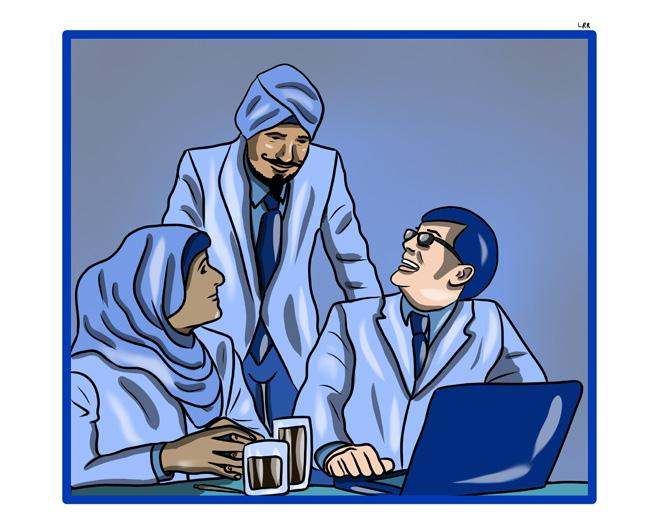
The event ultimately concluded that, in the workplace, if one person does not attempt to be supportive of diverse environ ments, others will create environments to their liking, which may not be in accordance with what everyone wants. It also concluded that diversity is not something to be managed, but rather fostered by providing an open and non-invasive environment where different people can work together.
The first BUCS EDI workshop was a success within the program, and will be ex panded to the rest of the Bishop’s community in future months. Anyone interested in these workshops can find the dates and times on the BUCS Instagram @bucsonline. The event is
open to feedback, and all those who attended are encouraged to send responses to Abe or
BUCS.
One year after the message “He raped me. I reported. He’s still in my class. BU Take Action” was painted across a cement barrier on the bridge leading to Bishop’s University, students and community members returned to Optimist Park to take part in the Silent Vigil for Survivors. The vigil was organized by the Sexual Culture Committee (SCC) on Thursday, Nov. 3, at 7 p.m.
People slowly slipped into a small gathering in a corner of Optimist Park. Quiet conversations, the odd comment about how few people were at the vigil compared to the one held last year, people glancing towards the bridge to make sure any stragglers knew to head to Optimist. SCC members passed out tealights to those walking in. The number of attendees at this year’s vigil hovered around 45 people.
Georgia LaPierre, one of the senior co-chairs of the SCC, opened the night and thanked all who showed up. She recalled the message on the bridge as the event that “ignited a call for action” last school year. “Just because the year is past doesn’t mean there aren’t survivors around here today,” she said. She explained the events for that night: a moment of silence for two to three minutes, followed by a recording of the “Wildflower” song sung by Special Advisor to Indigenous Student Support Vicky Boldo. Then, attendees could write messages of support on a large white banner that would be hung on the bridge, where they could also leave their lit candles.
As Boldo’s voice eased the attendees
out of the silence, others joined in, murmuring the familiar song. Though the speaker playing “Wildflower” had a battery malfunction, the small crowd welcomed light laughter.
Caroline Homet, a third-year Bishop’s student, said that the vigil was important “for survivors to know we haven’t forgotten them.” For her, around this time last year, there was a lot of anger that needed to be felt. “But now, we’re having conversations we couldn’t have had last year,” she mentioned, referencing the Take Back the Night Forum held on Oct. 19, where participants discussed topics like perpetrator rehabilitation.
A former Champlain College student, requested to be known as Megan, came from Richmond to attend the vigil after reading about it in The Record. She attended Champlain in 2014, when the bike path through Bishop’s golf course leading to the Champlain residences was unlit. She spoke about how the darkness of that path and stories of sexual assault happening there led many students, especially if they were alone, to choose to walk the loop down College St. and up Queen St. to reach Champlain residences at night. She was attending McGill last year when she saw the story of the bridge, which came as a shock, but she remembered that sexual violence was always a well-known problem in the area, albeit it being “hushed”. Noting that the bike path now had lights and there were improved safety measures, Megan also pointed out that while security may be available 24/7 at Bishop’s, it couldn’t
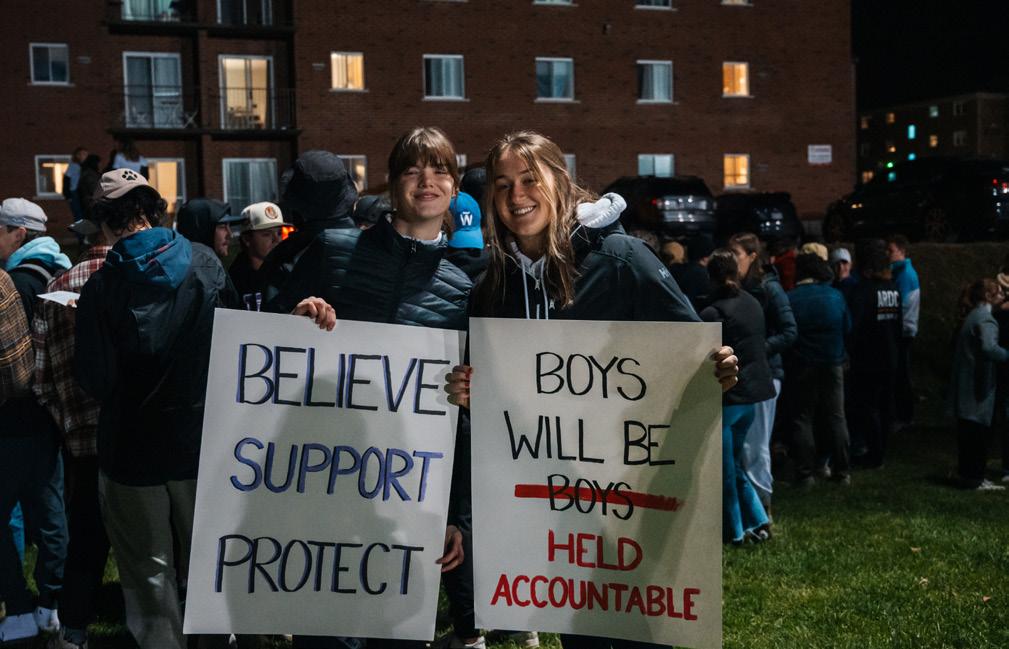
be assumed that people always had their phones on them to call for help. “My phone is dead right now,” she mentioned.
Jaclyn Dykstra, a third-year student at Bishop’s, encouraged her co-workers from Student Safety to attend the vigil that night. Though she found the number of people present at the vigil disappointing, she was encouraged that people showed up despite the event not being publicized as much as last year. For her, it was more important that there are supporters of survivors, “whether they are here or not.” She said the conversations around sexual violence have changed “tremendously” over the last year. However, when asked to compare how she felt around this time last year to seeing Bishop’s now, Dykstra said she still feels a lot of grief, not so much optimism. She maintained that most of the people she spent time with in her first year were no longer at Bishop’s, leaving because of the effects of sexual violence.
The SRC’s website is a relatively new creation in an attempt to increase transparency and student engagement. This website was created over the summer of 2021 and requires a great deal of navigating to find any information, assuming of course that the information available is public and up to date.

SRC meetings are open to the student public. While this is true, outside of the occasional cold and uninviting email from the Secretary General, it is also extremely difficult to find out when and where they are being held. Students are inundated with so many emails that border on spam that an email with an uninformative subject line is a terrible way to reach them. The emails also omit any details on what the meeting’s content and previous meetings’ content are. Meeting information is not on the calendar of their website and, after a great deal of digging, seems to be listed at the end of the recorded minutes from their meetings. The most recent public minutes are from the meeting on Oct. 17.
In the September meeting, little content was discussed. A letter of resignation was received from Jay Dasani, Graduate Student Senator, on Sept. 19. He had formerly run for president. A few minutes later, congratulations were shared as 23 per cent of students voted in the fall elections. The remainder of the meeting was used to discuss positions in clubs and government that needed to be filled. The financial records of the SRC are public. After some looking, it was made clear that between 2020-
2021 and 2021-2022 financial statements, there was an increase in payroll expenses by about $30,000. Seeing as how the pay for most student jobs in the SRC are either salaried or honorarium, this is a large sum of money and I believe it should be made public how it was allocated. This is particularly pertinent as it came at the same time as an increase in student fees, and student money should be reinvested in student initiatives.
Further research into the 2021-2022 year also revealed that Toast radio had been allocated a projected budget of about $8,000. The budget for the 2022-2023 year is not online yet. While this is a small sum for a radio station, Toast has produced a single 13 minute interview in the last 11 weeks. If the radio is incapable of producing a reasonable amount of content, it should be disbanded or have its funding reduced to match its output.
Beyond the finances of the SRC, it is very difficult to find information about the organisation itself on its website. While the events it runs are all public and accessible, the strategic plan, social media, Gaiter Good News, and the Quad yearbook tabs are all labelled “coming soon” and have no other information posted. Students looking for the bylaws can find that information under the constitution tab.
I would strongly urge all students to either look into the website or speak to members they know in the SRC if they have any questions or concerns. While holding public meetings are nice, if the effort put into advertising these meetings is practically non-existent they may as well be private. The student
On Nov. 9, an email was sent to the student body explaining that the pass/ fail option, wherein students can convert numerical grades into a P or an F on their transcripts, will not be in effect this semester. Pass/fail was introduced at the beginning of the pandemic, as a form of “compassionate grading” designed to support students through the increased burden of study during the pandemic. In 2020, students could convert any number of courses to a P. Any grade under 50 was converted to an F. In Fall 2021, as classes were returning to inperson, students could choose one of their courses to convert to a P or an F per semester. It seems that the decision to remove pass/fail completely is based on the premise that the pandemic is over, that it no longer affects students’ abilities in their academics, and that compassionate grading is a thing of the past.
This false premise makes this decision worrying. The pandemic is not over and students continue to feel its effects. With ongoing cases and long COVID, the pandemic is still very present in the lives of students. Students are still in need of
accommodation, flexibility, and compassion. The decision to not extend pass/fail communicates to students that their ongoing difficulties are invalid, and that they need simply to work harder to return to normal levels of output. In addition, it assumes that classes are in-person and learning is as it was previous to the pandemic. While my situation is not representative of all students, in the five courses I registered for this semester, only one is currently running in-person. In my eyes, my situation has not changed from last year to this one. Why should students lose compassionate grading systems when the need for compassion persists? Importantly, even if the pandemic truly were over, extending pass/fail and implanting a more permanent version would still be a better decision.
Many students have been hoping that compassionate grading, and a pass/ fail option, would be maintained beyond the pandemic. McGill has a pass/fail system wherein students are able to convert numerical grades for their electives, allowing students the freedom to explore courses outside of their disciplines without being
government should be transparent in their actions and decisions. Accountability is the key to government, and the SRC’s performance in the last year does not reflect this.
overly concerned about the ways in which this exploration will affect their GPA. This system emphasizes learning and broadening horizons beyond your comfort zone. Bishop’s should be able to draw on the systems used at other universities to create something that fits the needs of our students.
The decision not to extend pass/fail also fails to consider that for many students currently at Bishop’s, the pass/fail system has been in place for the entirety of their university studies. Each time pass/fail has been extended, it has been with short notice to students. For example, students were made aware on Dec. 17, 2020 that it would be in effect in Winter 2021. By communicating when it is extended and not communicating until just before finals that it is not extended, this assumes that the default is that we do not have pass/fail, an assumption that is clearly not made when inhabiting the mind of a student. Students currently in their fourth year experienced one semester before the initial COVID lockdown, and one semester is not enough to properly manage the realities and challenges of being a university student. While the limited pass/fail of 2021
did present a kind of transition, students were not aware of what to expect at the beginning of this school year, which is not setting us up for success.
The decision not to maintain the pass/fail option is a huge step backwards. If Bishop’s is going to call itself studentcentred, it needs to create systems that support student learning instead of pushing students to carry on as if their problems don’t exist.
After a year of eating at Dewies and hearing nothing but complaints about food, I began to wonder if that was truly the cost of Dewies. The ubiquitous complaints about food quality are usually unfounded and do little more than show that many students are experiencing life outside of their home for the first time. The real downfall of Dewies is the many hours that are wasted sitting and talking to friends, friends of friends, and friends of friends of friends.
When food and housing are sorted out for on campus students, the most tangible currency that must be managed is time. Between clubs, class, and events there is always something to do on campus. Dewies undermines this by operating as a centralized location for seeing people. If the Gait was open for earlier hours of the day, or if meal cards worked during the day at the Purple Pod, this may be lessened.
The location of the buildings also discourages students from eating food from Provigo because Patterson is the farthest building on campus from town. This entices Patterson residents to retain their meal plan for convenience.
If students were able to bring their backpacks into the dining hall, this would also reduce the wasted time by facilitating the use of laptops to work. While it is obvious that Dewies wants to prevent theft, the constant circulation of employees should be effective at regulating it.
Attending in between meal periods also incites students to wait and waste more time for hot meals to be served. During the hours between lunch and dinner there are almost no available food options, thereby making students feel pressured to just wait the extra thirty
minutes for food to be available.
The inherent time wasting that Dewies carries is something that must be considered when students are looking at meal plans. While one argument in favor of Dewies is avoiding cooking time and meal prep, the quality of the food and total time spent at the dining hall is far more costly.

In addition, during the winter months, students are more likely to spend
time at Dewies in order to procrastinate returning to their homes. The cold and harsh Quebec winters leave many students whiling away several hours at a time in the dining hall rather than at clubs or events.
First-year students who live in residence account for an enormous portion of the population at Dewies. There is a possibility that first-years are less likely to get involved in extracurriculars,
and instead substitute it with socializing at the dining hall rather than engaging in more meaningful and long-term forms of socialization.
Rachert - News EditorEvery student who can afford to go on exchange should do so, and exchanges should be made more accessible. International exchange is a unique opportunity for students to travel and learn about other cultures while being offered a support system through Bishop’s — students have more financial and social support through doing exchange than they do travelling independently.
As application deadlines draw near, the international exchange office has been sending regular emails to students encouraging them to attend international exchange information sessions. There are three sessions in total — two held in Cleghorn room, and one held online. The sessions are intended to provide basic information regarding visa applications, culture shock management, affordability, budgeting, and deadlines. The info sessions inform students of the qualifications needed to go on exchange — all students with an average of at least 70 per cent who are
currently completing their first degree and have completed at least 30 credits are eligible.
Students pick three schools from the list of pre-approved exchange schools, ordering them by preference. Schools located in a variety of countries and operated in a variety of languages are available on the list; therefore, students in the modern languages and international studies departments are especially encouraged to apply. An international exchange is recommended by the politics and international studies department for all international studies students in an honours program. Students interested in politics are given the opportunity to study at universities in cities like Maastricht and Paris, major European political hubs. Students looking to learn other languages can study in Germany, France, Japan, and Mexico, which correspond with the languages offered through the modern languages and literature department. Bishop’s is partnered with more than 60 total institutions to offer exchange.
International exchange offers an opportunity for students to expand their worldview on a budget. Students on exchange can qualify for automatic bursaries of $750 a month or more offered by the Quebec Ministry of Education to assist with the costs associated with travel. To qualify, students must be attending an accredited institution, and must be full-time. Tuition also stays the same for all Bishop’s students — students with scholarships will also still qualify for their funding. International exchange is still costly, but the bursaries offer opportunities to a large group of students who otherwise would be unable to travel on exchange.
Exchange also does not add any time to a student’s degree — all credits, so long as they are approved by the student’s department, count towards their degree at Bishop’s. Students can go on exchange during the fall, winter, or summer semesters. International exchange is one of the most accessible ways for a student to travel abroad, with funding opportunities and
work exchanges being offered. Any student interested in going on exchange can find out more information by attending the online info session offered on Nov. 15.
The women’s basketball team opened the first of two games on Thursday night. The game started off really close, with both teams prepared and focused on playing their best. However, the Gaiters knew how to take advantage of the score especially with the outstanding duo Siciliano-Kabunda. By the end of the first half, the Gaiters were in the lead by 12 points.
In the second half, the quarters were really tight, with 17-14 and 12-11 for the Gaiters. This made the fight for the rebounds really important for both teams. For Bishop’s, the top scorers were Jael Kabunda with 16 points and 7 rebounds, Amaiquen Siciliano with 15 points and 8 assists, and Victoria Gauna with 14 points and 6 rebounds.
The women’s team pulled off an impressive 73-57 win over the Martlets to start off their season. They are now preparing to travel to Montreal to play the Concordia Stingers on Nov. 10. After that, they will be returning home to play Université Laval.
Also, we would like to give a very special shoutout to the women’s new
The men’s basketball team received a warm welcome during their home opener at Mitch ell Gym. Following the women’s victory, the team went out to the court with a winning mentality. However, the first and second quarter were very close in score. Both teams went at it at both ends making it a close score at halftime. The lack of scoring from the three-point line did not allow Bishop’s to take the lead before the half. As we have seen in previous games, the Gaiters tend to come back out from the locker room with high energy and focus on details. Unfortunately, this time the accuracy in the shots was not there for our purple players. It was in the fourth quarter where things really started to line up, and the squad splashed a few threes in a row that allowed them to come back. The last minutes were very intense, with both teams interchanging in the lead constantly. Ultimately, it came down to minor details such as free throws and defensive rebounds that made the ultimate
difference. McGill was not able to score in the last play of the game, per mitting Bishop’s to win by a nail biting 72-71 score. Players such as Charles Robert and Hisham Saleh had a great participation in offense, with 22 points and 15 points respectively.
The men’s team will also be traveling to Concordia on Nov. 10 where both teams are hoping to come home with another win for the beginning of their seasons.
The women’s hockey team has had an incredible start to their season, winning six out of eight games in September and October. The Gaiters have been on the road quite a lot, playing teams from Queen’s University, Carleton University, McGill University, and Concordia University.
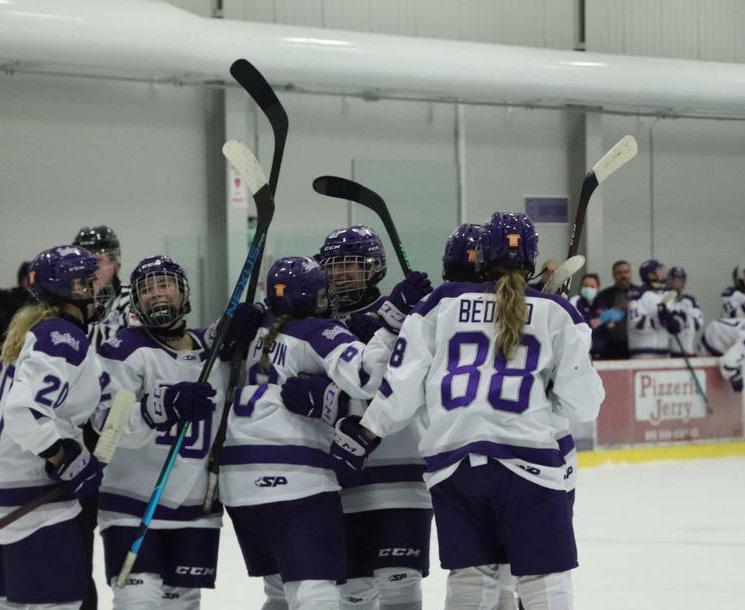
Nov. 4 @ Université de Montréal
On Nov. 4, the team traveled to Montreal to play the Carabins, whom they have not had much luck against in the past few matchups. The women were confident and determined to play their best and keep up the powerful drive they have demonstrated so far.
The Gaiters were first to score a goal in the second period during a power play opportunity. The pace of the game picked up drastically in the third period with the Gaiters securing another goal to lead 2-0. The Carabins fought back hard, scoring two goals within eighteen seconds of each other, tying the game at 2-2. The Gaiters took a minute to regain their focus and soon after scored another goal to put them back in the lead.
With about five minutes left in the game, the Carabins found the back of the net again, causing the game to go into overtime. Both teams came back from the small break determined to take the overtime win but unfortunately within just 30 seconds, Montréal got the puck past the goaltender, Aglaé René de Cotret to win the game 4-3.
Nov. 6 vs University of Ottawa
The women’s hockey team was extremely excited to host the Gee-Gee’s for their home opener game at the Jane & Eric Molson Arena just two days after playing against the Carabins. The stands were
packed with family and friends who came out to support the team.
After the first period was over, the Gaiters were up 1-0. The second period brought another goal from the Gaiters before Ottawa battled back and scored two goals to tie the game 2-2. By the end of the third period, it was looking like the game might go into overtime, but the Gaiters successfully found the back of the net, receiving an exciting standing ovation from the crowd who were on the edge of their seats the whole period. With goals from Angelique Pagé, Maude Pépin, Krystele Fontaine, and Jöelle Gagnon, the Gaiters were proud to win their game 4-3 on home ice.

The Gaiters have two more home games before they take to the road again. They clinched an overtime victory on Nov. 11 against Carleton University. The Concordia Stingers will be visiting on Nov. 13. Be sure to come out and support our student athletes who have been working so hard this season to keep up the positive momentum!
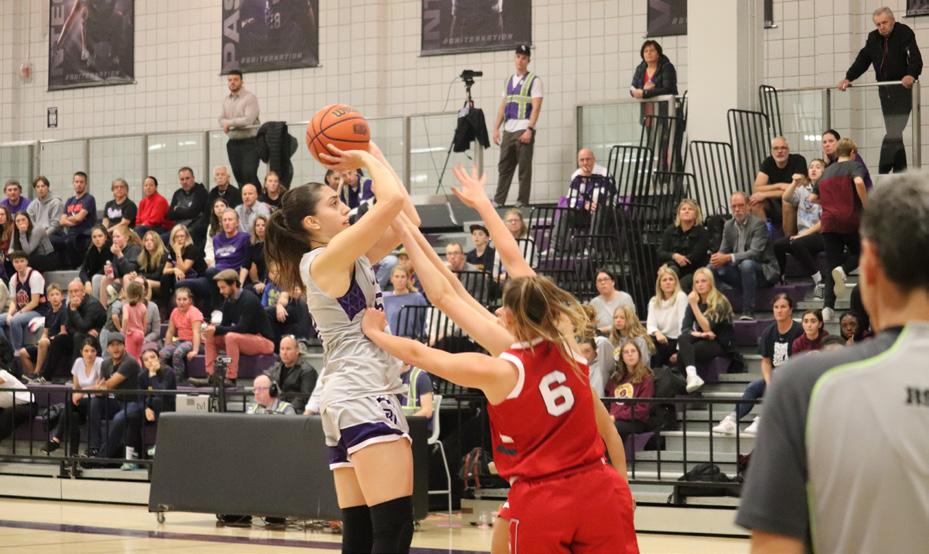
Oct. 29 vs Carleton
Carleton University is one of the most underrated teams that we have seen in the league these past two seasons, and even though they do not show a successful record, they somehow give us a run for our money every time we play them. The game at Coulter Field was neck-in-neck all four quarters with many exciting goals, defensive plays, and goaltending from both teams. Going down by two goals into the fourth quarter, the Gaiters needed to create offence and fast. The Gaiters came back and won the game 7-6, securing their spot to the Baggataway Cup. With a supportive crowd cheering them on from the stands, the team was ecstatic
to have won the playoff game against the Ravens.
Nov.
The Gaiters traveled all the way to Trent University in Peterborough where the Baggataway National Championship was being hosted to face off against Brock University in the quarter finals. In last year’s Baggataway tournament, the Gaiters lost to Brock in the semi-finals, so this year’s game would be a chance for the team to get their revenge.
Expectations were set high for the Gaiters going into the game, and we all felt confident that we were going to make it to the end. The Gaiters came
firing out of the gates scoring the first two goals of the game within minutes of the first quarter. The Badgers responded with four unanswered goals to end the quarter 4-2. Spirit levels were still very high on the bench, and we did not let the score affect our attitude. Going into the fourth quarter, the score was 7-5 for the Badgers which was the same situation we were in against Carleton just the week before. Unfortunately for the Gaiters, time was not on our side and we lost in a heartbreaking 8-7.
For the graduating players, the game was not the way they would have wanted to end their careers, but for everyone else on the team it sparked a desire for success in the 2023 season.
Overall, this season was an
A lot was at stake for the Gaiters on Oct. 29 as they hosted the Saint Mary’s Huskies. A trip to the AUS semi-final was on the line. Both teams stood at 3-3 on the standings, and this game was worth four points because their previous matchup in Halifax had been canceled due to the aftermath of hurricane Fiona. The team that came out on top would pay host to the Mount Allison Mounties the following week in the semi-final.
The Gaiters defence started where they left off last week by forcing a turnover and setting up the offence on the doorstep of the end zone for David Chaloux to score the first major of the game. The Huskies secured a touchdown of their own in the second quarter on a 10-yard run. With a strong defensive performance through the first three quar ters, the Gaiters had a 11-10 lead. The Gaiters rallied their troops during the fourth, scoring twice, once on the ground with Chaloux for his second major of the game, and again through the air with a 45-yard touchdown pass from quarter back Justin Quirion to Ianis Cherdieu. This put Bishop’s up 25-10. A late push by Saint Mary’s in the fourth was not enough though they found the endzone with 1:33 remaining on the clock.
The Gaiters secured the win at home with a final score of 25-17, punch ing their way to the playoffs and setting themselves up with home field advantage against the Mount Allison Mounties.
For the third year in a row, the Gaiters met the Mount Allison Mounties in the AUS semi-final with a trip to the
Loney Bowl on the line. In their previ ous two playoff matchups, the Gaiters had gotten the best of the Mounties and advanced to the Loney Bowl. It was safe to say that the Mounties entered Coulter Field with a sense of urgency to get the monkey off of their backs that was the Bishop’s Gaiters.
As games between Mount Alli son and Bishop’s often go, it was a defen sive battle all afternoon and the team who capitalized on mistakes would end up winning the game. The teams were dead locked at 5-5 entering the fourth quarter. Early in the fourth, the Gaiters drove the Mounties back and scored the first major of the game on a 11-yard pass from Justin Quirion to receiver Gabin Leux to put the Gaiters up 12-5. The touchdown felt as if it might be enough to secure the win for Bishop’s if they kept their hand steady throughout the rest of the game.
The Gaiters were forced to concede a safety with 2:30 remaining on the clock but hoped the defence would stand strong like they had all day. On a Mounties third down, linebacker Gabriel Royer knocked down a pass and set up the offense with a chance to run out the clock to send the Mounties home empty-handed. But the Mounties defence had other ideas, forcing a punt on the third down with an errand snap that went over punter Noah Laursen’s head. This set up the Mounties offence with great field position with 1:33 left.
The fierce Gaiters defence stopped the Mounties on first and second down forcing yet another third down. Mounties quarterback Justin Vogels sailed a prayer that went through the hands of a Gaiters defender and found

the Mounties’ receiver Cody Barton who ran into the endzone to put them up 13-12. With a successful two-point conversion, the Mounties took the upper hand 15-12 with a chance for the Gaiters to drive up the field with under a minute remaining. Unfortunately, their efforts proved unsuccessful and the Mounties sealed their victory with an interception.
The Mount Allison Mounties will now face off against the StFX X-Men next week in the Loney Bowl with a chance to host a National semi-final against the winner of the Canada West conference. As for the Gaiters, they wrap their campaign with a 4-4 overall record and look forward to the 2023 season.
On a brighter side, four Gaiters were named to the 2022 AUS All-Star team; offensive line man Mitchell Martel and running back David Chaloux, and on the other side of the ball, defensive lineman Liam Patton and line backer Gabriel Royer. Second-year Gabriel Royer was also named AUS Defensive Player of the Year. The Gaiters hope to continue to build on this year’s success and enter 2023 to follow up on the program’s recent success.
interesting experience. We went through tremendous highs such as beating Trent on our home field which had put us up 5-0, but also tremendous lows such as losing to McGill on homecoming night. We learned, we fought, we won, we lost, we humbled others, we got humbled, and we showed a lot of character. The focus during this off-season is to get better individually before we come back to the next training camp. We have set the bar high for each other and now all we can do is get back to work. The job is never finished.
During the 2021 SRC election debates, a highlighted issue was the lack of student involvement and knowledge about the SRC. Most students are aware that the purpose of the Student Representative Council is to work with the administration and faculty to advocate for students, as well as being an opportunity for students to gain political experience. It is also a major sup plier of funding to student clubs and other projects.
Many students have mixed feelings about the SRC, since it draws its funding from school fees, and its projects do not always have immediate results. Despite this, the projects of the SRC have been relevant in recent years, such as overseeing the review of the sexual assault policy, making basic necessities more available to students, and supporting Eco-Week and other sustainabil ity initiatives. There are also longstanding projects such as O-Week and Doolittle’s Co-op that have an impact on student expe rience, yet are not necessarily well-known as part of the SRC.
Some pertinent recent projects include the Meal Care program, which attempts to reduce food waste from Dewies and other locations on-campus by giving the leftover food to those who need it. Another proposition is for more affordable menstrual products, which is due to be voted on in the coming days. The SRC has worked with the Sustainability Office on various projects, including the Community Cupboard, a food pantry available to those struggling with food insecurity.
When asked about ways for students to get involved, Secretary General Karen Dymond said that being a student representative is a great role because it is an opportunity to share one’s perspective on the Bishop’s experience. These positions are
usually elected by other students and involve representing the student body and initiating various projects, depending on the particular post. About her own role as Secretary Gen eral, Dymond said she enjoys being able to work directly with students and support their projects.
Current SRC President Camilla Rizzi sees her role as an opportunity for advocacy and change. She is the first Indige nous SRC president, as well as the youngest, and she plans to use her office to advocate for student needs. The beginning of her involve ment in student government came from her role as a student activist after the confession on the Arches bridge in fall 2021. According to her, various students suggested that she run for office.
When asked what advice she would give for students looking to get involved, Rizzi said: “There’s a spot for everybody. If there’s not room, make room.” She said that her experience with government is that peo ple often like to keep things the same, saying that individuals have to speak up to make change.
One of Rizzi’s main concerns since taking office has been mental health advo cacy. She says that due to her experiences as a person of colour, “I’m able to have those difficult conversations.” Bishop’s continues to expand its mental health support, with drop-in counseling available to students in addition to the Peer Support Centre and Sexual Violence Support Centre. Some of this support relies on the efforts of students, not only professional counselors.
Probably the most popular way to get involved with the SRC is volunteering at events, particularly O-Week and Winterfest. In addition to being the most popular events, they also have the largest portion of the SRC budget after salaries and payroll. And interestingly, the biggest revenue source after
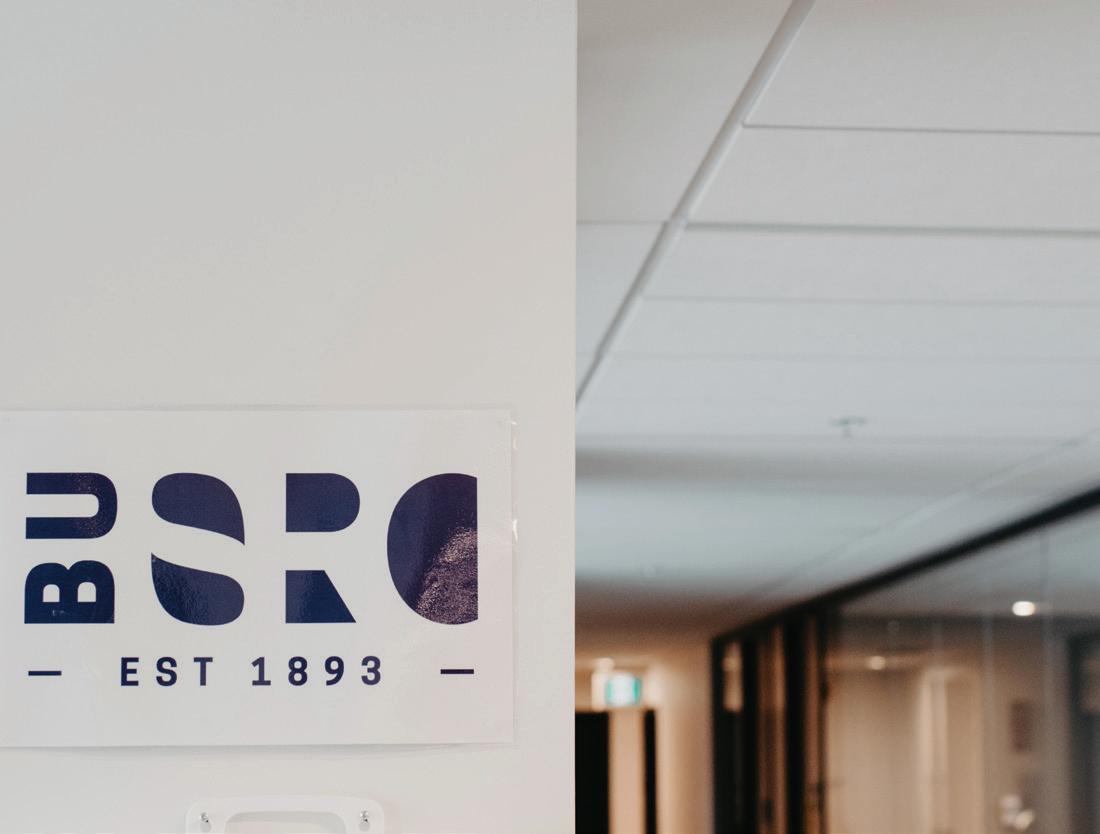
student fees is sales from the Gait.
Anything that costs money will be controversial on a college campus, and it makes sense from a student perspective, since off-campus students benefit less from campus initiatives. However, the situation is not as simple as giving up extraneous events in order to have fees reduced. Many students who are involved find the benefits of these programs incalculable – for instance, the printing costs of the creative writing journal are paid through SRC funding. Not to men tion that the SRC is compensating stu dents to be activists and advocates rather than forcing them to choose between work and involve ment.
The programs of the SRC are too many to name, and this newspaper has covered many SRC-sponsored events, since most programs on cam pus lead back to that institution. Any form of governance leads to questions about its purpose and legitimacy, but in this case students are able to answer these questions not only through observation, but also through their own contributions.
Connor Kay - Staff Writer“Let’s empower more people to scream and raise their voices” said Anika Malone, co-founder of Bishop’s Sexual Culture Committee during the forum.
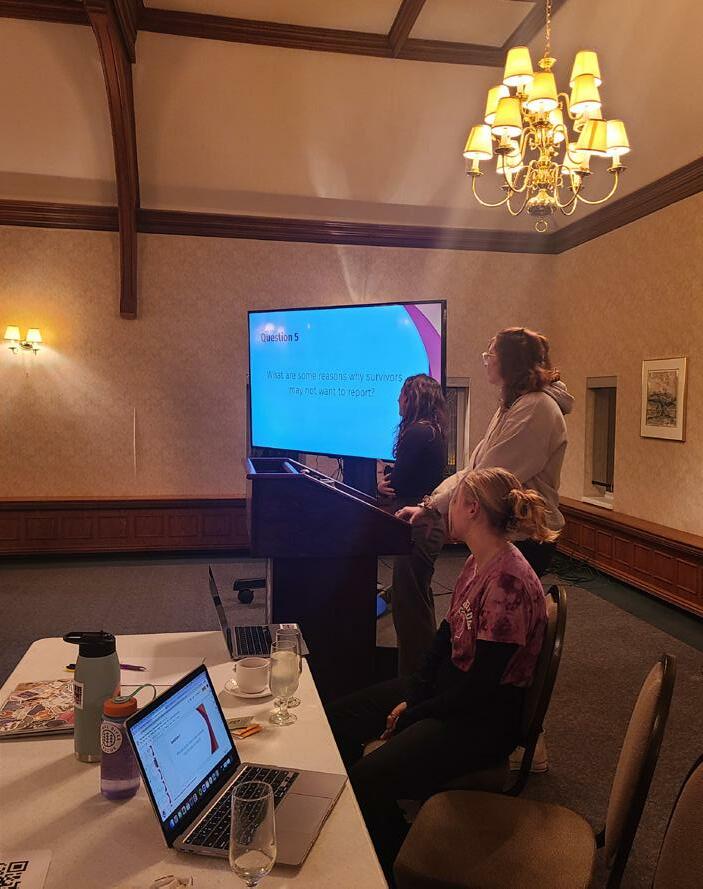
On Oct. 19 between 6:30 and 8:30 p.m. the Take Back the Night Forum took place in Cleghorn to offer the opportunity to all in-person and online participants to discuss questions surrounding sexual violence.
The co-hosts of the event, Bishop’s students Georgia LaPierre, Karen Halliday, and Amie Godward, started by listing multiple organizations and hotlines available for all victims of sexual violence and all people wanting to discuss the topic. They followed by introducing the few guests of the evening, who added to the forum by sharing testimonies, insights, support, and resources.
The forum was conducted in a friendly and inclusive ambiance. All participants sat in small groups of around two to six people to discuss topics and issues before summarizing their discussions to the general audience.
To encourage collaboration and discussion, the Sexual Culture Committee created a safe space in which participants with different backgrounds could discuss uncomfortable
questions and topics. For the committee, it is now important to normalize that having uncomfortable discussions is a good way to create changes in mindsets and ideologies. To facilitate the creation of conversations, the committee provided a list of questions on several subjects to participants. The attendees had a few minutes to discuss in small groups before sharing their thoughts with the rest of the group. The co-hosts encouraged all participants to be very respectful while answering questions and talking. One method the hosts suggested was to replace “no but” with “yes and” to make sure no comment or testimony was discredited and that participants feel comfortable.
Although the forum had the goal of creating inclusive discussions and hearing more people’s intake on the topic, the cohosts and founders of the Sexual Culture Committee also wanted to learn more about ways to improve sexual violence reporting techniques, as well as finding ways to make sure Bishop’s students are aware of the resources available to them in the case of sexual violence or other issues regarding mental health.
To close this event, the co-hosts mentioned that it is possible for everyone to find information regarding sexual violence,
mental health, and the reporting of any event that might them feel uncomfortable. All resources are listed on the Bishop’s website in the “View all resources” section including the REES website (Respect, Educate, Empower Survivors) or at https:// reescommunity.com/campus to report acts of sexual violence. Online reporting systems offer more privacy to the person filing the report.
The Silent Vigil for Survivors took place on Nov. 3 at Optimist Park, and Take Back the Night took place on Nov. 10.
For more information about the Bishop’s Sexual Culture Committee, everything is posted on their Instagram @ busexualculturecommittee. A pamphlet including more resources is also available on their Instagram account.
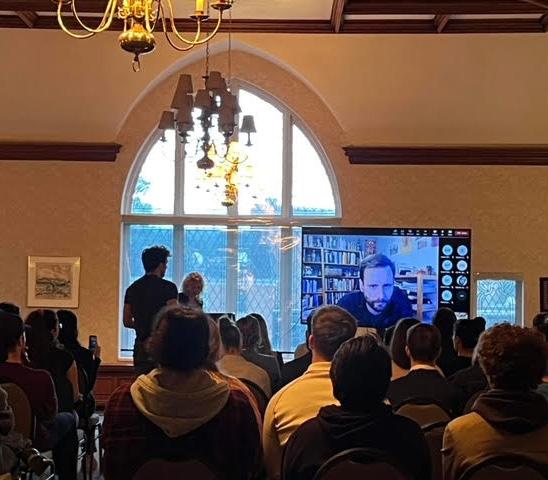 Leo Webster - Senior Copy Editor
Leo Webster - Senior Copy Editor
A seminar on Iran, titled Women at the Vanguard: The Roots of Iran’s Popular Uprising, was held on Monday, Oct. 24 at 4:30 p.m. in Cleghorn by PISA, the Politics and International Studies Association, in order to give students an understanding of the political and social context of the current events evolving in Iran. Speakers included Dr. Thomas Juneau, an associate professor at the University of Ottawa’s Graduate School of Public and International Affairs, and Dr. Daniel Miller, associate professor at Bishop’s University’s department of religion, society and culture. This event was moderated by Dr. Sarah-Myriam Martin-Brûlé, a full professor at BU in the department of politics and international studies.
This event began with an introduction, land acknowledgement, and plan for the evening by Meaghan Connelly, the Director of Events for PISA. She explained that the purpose of the events was to give students background information into the protests occurring in Iran, and introduced the next speakers, Dr. Sarah-Myriam Martin-Brûlé and Dr. Thomas Juneau, who joined the seminar on Teams.
Dr. Juneau presented a 20-minute explanation focusing on four aspects of Iranian foreign policy: geography and its implications, Iran-US relations, defence doctrine, and a case study of Yemen. His presentation was followed by questions from the audience. While answering a question from the audience, Dr. Juneau said, “The protests in Iran are genuine… The tens of thousands of people we see in the streets of Iran are not supported, motivated or encouraged by the US or Israel or Saudi Arabia. These are Iranians
who are fed up, rightly so, by what is an extremely brutal, theocratic, dictatorial, oppressive, violent regime government in Iran.”
Dr. Miller followed Dr. Juneau’s presentation with his own on the history, politics, and religion of the region, as well as an explanation into the death of Mahsa Amini. His presentation was supported by videos throughout the decades and reports by news outlets around the world, as well as explanations of vocabulary, important names, and relevant moments in history. “It may be said that the women’s rights movement in Iran has been going on for almost a century,” said Dr. Miller, “but this is the first time that women in particular have sparked widespread protests and have led them.” At the end of his presentation, Dr. Miller chose to play “Baraye,” a song that has become an unofficial anthem for the protests. In a powerful show of solidarity, many members in the audience sang along. Following his presentation, two Iranian students from the Université de Sherbrooke in the audience introduced themselves and asked for the support of the people there, asking for voices and concrete actions.
“How it went was so much better than I could have imagined,” said Connelly after the event. “I think the ending with the song was just so important to have, it was so touching to the Iranian students present.”
When asked about what PISA would do after the event, Connelly replied “What we want to do is keep the conversation happening.”
On Tuesday night, Nov. 8, the Gait hosted the viewing of the U.S. midterm elections. The most popular race of the night that seemed to draw everyone’s attention was former NFL player Herschel Walker running as a Republican senator in the state of Georgia. Walker has had allegations brought forward for pressuring past girlfriends and partners into abortions. This may have been the deciding factor for his loss, pulling in 48.5 per cent of the votes.
Within the participating crowd of involved students, who discussed politics in good spirits, were professors from the university whom I had the chance to talk to for further information on the midterm elections. Dr. Jacob Robbins-Kanter, a new professor at Bishop’s University, when asked about the midterms, was more than glad to explain the U.S. legislature. The US Congress is composed of the House of Representatives and the Senate, which have seats up for elections on the federal level as people are voting for their representatives and senators depending on the state.
People also vote at the state level for state representatives and governors, as well on referendums, which could include topics such as the legalization/decriminalization of marijuana or stricter emission standards to combat pollution.
Dr. Robbins-Kanter explained that the southern U.S. is generally a dominantly Republican area which makes the race less competitive in areas like Louisiana, Alabama, and Mississippi. However, states like Georgia, Texas, and Florida are becoming more politically balanced but still lean to the more Republican side of the scale. On the flip side, the northern states are most often found to be Democratic, although there are the exceptions of some tight races in New Hampshire and Maine while the majority of the Northeast remains blue.
Overall, in the United States, Dr. Robbins-Kanter found that Wisconsin may be the closest race in the country as the governor’s race involves Tim Michels, who denies the outcome of the 2020 election against Tony Evers, representing the Democratic party, who gained 51.2 per
cent of the vote over Michels’ 47.8 per cent. Not only was the governor’s race extremely close but the Senate race was very tight between Republican Ron Johnson and Democrat Mandela Barnes. Johnson has been noted to be among the 2020 election deniers but managed to pull ahead in the polls with 50.5 per cent of the vote over Barnes.
When asked how the results of the polls will affect the next presidential election, Dr. Robbins-Kanter stated that generally, the party in power after the presidential election loses seats during the midterms which applies to both Democrats and Republicans. Though parties will lose seats in the midterms, it will not always affect the outcome of the next election as seen during Obama’s presidency when the Democrats lost many seats, but Barack Obama was reelected for a second term.
In closing my conversation with professor Robbins-Kanter, he mentioned that the elections feel different this year just from the mail-in ballots that may come in late and take up to a few days depending on state regulations. For example,

Seven international students are exploring Sherbrooke to discover its murals. Lysange Gervais, coordinator and immigration advisor of Bishop’s Interna tional, guides the group. She explains the town’s history and culture depicted with in the murals. This event was organized by Bishop’s International on Oct. 16 for international and exchange students. It’s a sunny Sunday morning, and seven international students from Mumbai, Germany, France, the north of China and Ukraine are investigating the murals in Sherbrooke. Gervais dares them to find an elf and maple leaves in the immense work of art named “Mural des Jeux du Canada.” It was inaugurated in 2013
for les jeux d’été du Canada. When the students “observe [the elements of the mural] together,” said Alona Lypovsky, a Ukrainian student majoring in psychol ogy, they “go to places [they] wouldn’t go by [themselves].”
Gervais guides the group to the heartshaped mural on Wellington Street. She points out a drawing of “Madame Boo” on the wall, a woman who was living in this very building and scared passersby for fun. The group laughed at the news. “We make new friends, and we share things of our culture,” said Pratik Pravin More, a computer sciences graduate student from Mumbai, “it’s a bonding experience.” The mural made him think
about garba night festivals in India, which are dance festivals that have both religious and social significance. Gervais asks the students to observe small details from the murals. By doing so, she encourages them to reflect on their current and past experiences. “During COVID, we didn’t get the chance to do anything,” said More, who is one of the many international students impacted by COVID. “Now [that] there are a lot more people, [it’s fun].”
The Sherbrooke mural tour is an annual event organized by Bishop’s Internation al. The event was canceled during the COVID-19 pandemic, but it’s now more attractive than ever. In fact, the office
held multiple tours on Oct. 16 because so many international and exchange stu dents registered. According to Lypovsky, international students want more events like the mural tour to feel more integrat ed into Bishop’s community.
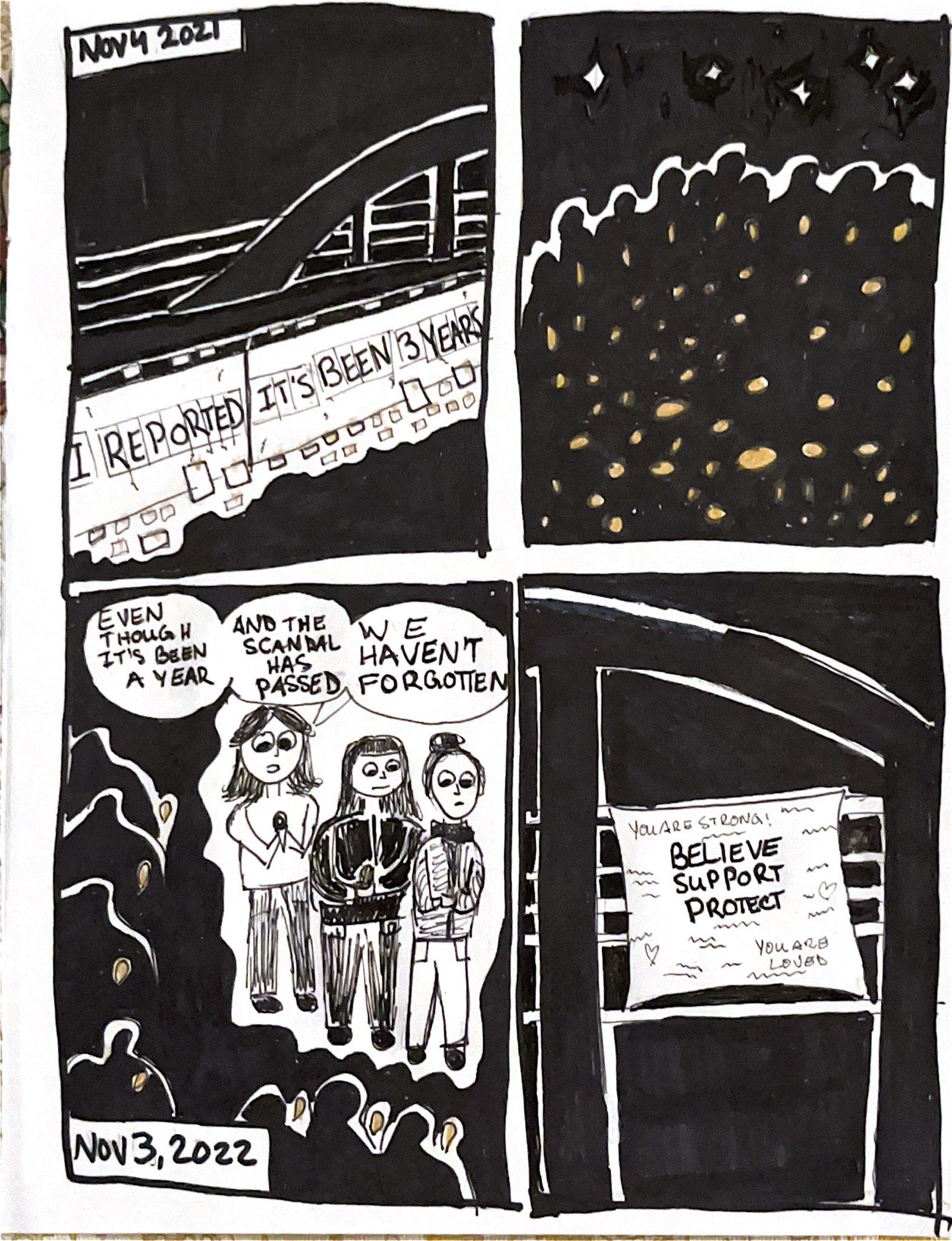
Soaring arches and spires of brick and stone. Low chanting hymns rake my conscience. Perhaps I paid too little for my sins. Perhaps I paid too much. I hear the dragging claws against the architecture and feel the eyes of Mephistopheles on me. Perhaps I have yet to pay.
I see my reflection in this dirty mirror but am not convinced that it is my own. The man who apes my movements seems filthy and half-starved. He sits on a chair by the desk, casting accusatory glares at me. He seems to blame me for his fate. The ill man who has stolen my reflection will soon be dead. He is utterly helpless.
Slapping feet against the cobbles, deep in the bowels of these catacombs. The stench of decay surrounds and assails me. The splint for my leg is shoddy and must be fixed every few min utes. Do not go to the inner cloister.
We acknowledge the Abenaki people and the Wabanaki Confederacy, the traditional stewards and protectors of the territories upon which we are learning. In performing land acknowledgement, we make what was invisible visible, and invite the land, the First Nations people, and the Truth and Reconciliation Commission into our conversations. This act of naming - of inviting something into language - is an underlying principle of advocacy and lies at the heart of higher education. The etymology of advocacy is ad (to add) + vocare (call or voice): the origin of the word’s meaning is to give voice to something or to call out in order to initiate dialogue. The “ad’ prefix makes explicit the importance of multiple voices - and by extension multiple perspectives. In this sense, advocacy compels us to acknowledge a diversity of thoughts and opinions as a starting point rather than as an ideal outcome. In institutions of higher learning, we have a responsibility to honour spaces for emerging and established voices to engage in productive, respectful, and sometimes even uncomfortable conversations where individuals are safe to speak truth to power, explore and challenge dominant ideologies, and call out injustices and inequalities in order to imagine new ways of existing.”
—Dr. Jessica RiddellElizabeth Beaumont thecampus.layout@gmail.com



I had the opportunity to inter view Zachary Saine, a third-year Bishop’s student in marketing & entrepreneurship who has transformed his following on social media into a brand that is becom ing well-known in the chess community. thechessnerd co. is a luxury chess brand that sells wooden chess boards in a lim ited edition fashion to people all around the world. The company was founded in May 2021, but the brand goes as far back as January 2018 when a “naive 16-yearold” named Zach started taking dimly lit chess-related photos in his bedroom. What started out as a new year’s res olution to produce chess content on Instagram blossomed into a worldwide following. After three years of posting daily chess content, what was once @ chess_nerd8 became @thechessnerd. In 2021, Zach had over 22,000 followers from around the world. This was the inspiration behind thechessnerd co. being purposefully all lowercase and without spaces, to represent an Instagram handle.
As the personal brand was built, Zach began to receive many requests about his personal collection of chess boards from his followers. He was com monly asked questions such as, “Where
did you get this board from?” or “Where did you buy those pieces?” This contin uous referral of his followers to exterior chess brands exhausted Zach, leading him to see an untapped market. He began selling luxury wooden chess boards and pieces that were handmade at a reason able luxury price point. thechessnerd co. does not sell mass-produced chess prod ucts, nor does it sell $10k chess sets like some other luxury competitors on the market. Instead, it sells a premium chess board that is one-of-a-kind and unique to the buyer. thechessnerd co. does not restock their “product drops” further adding value to their products.

Incorporated in May 2021, thechessnerd co. started out as an idea to source a rare and artistically designed board from Granada, Spain. It would be a product drop of just 25 limited edition blue chess boards that would be sold at a price of $400 USD on their newly launched website. The chess boards were released on July 20, 2021, which is also International Chess Day. Within three weeks, all 25 chess boards had sold out to customers in 14 different countries across five continents.
After their first success,
thechessnerd co. wanted to expand to a widely undiscovered chess calendar market. After intensive research and de sign, they launched 100 limited-edition calendars in early November 2021. After months of selling and promoting, only 22 were sold. Although fully designed by Zach himself, and super interesting, the calendars did not reflect the brand in luxury status. Additionally, the price point of $40 USD was considerably high for a calendar. However, thanks to the entrepreneurship practicum program that Zach was a part of, thechessnerd co. managed to recover most of their losses while learning a valuable lesson on market research. Unlike the chess boards that were high in demand before the first drop, chess calendars had never been heard of or requested by followers. Zach learned through this experience to test unknown markets with a smaller sample size before ordering such a large quantity, especially for a product with an expira tion date.
Zach has ambitious goals for thechessnerd co. He wants to grow his personal brand on social media (@ thechessnerd), which has over 100,000 followers across platforms, while also
growing the luxury brand over time. This semester, Zach made a risky move. He decided to do a 12-board limited edition drop during the busy school semester. So far, it has paid off with 75 per cent of the collection already sold at a price point of $500 USD each.
If you are curious about thechessnerd and its projects, you can find @thechessnerd across social media platforms and @thechessnerdco on Insta gram.

What’s a better time than the holiday season to make new connections? Here are four tips to make the most of LinkedIn and make new connections to brighten up the holiday period.
LinkedIn is a business network ing social media platform. It’s a great networking tool to get to know profes sionals in your industry, connect with people you know and find new oppor tunities. This season, Bishop’s University Commerce Society (BUCS) is giving you our four best LinkedIn networking tips. Now it’s time to cozy up in front of a fire with a warm cup of eggnog and start cre ating your LinkedIn profile. Follow these four quick tips to make the most of your LinkedIn profile.
A picture says a thousand words: Make sure your profile stands out by add ing a high-quality headshot of yourself as the profile picture, as well as a back ground/cover image that reflects your in dustry or personality. This is not the time to show off your ugly holiday sweater. Your profile picture should be profes sional and make you look approachable, friendly, and intelligent.
Join groups: Groups are forums where like-minded individuals can chat about topics they are passionate about! One of the best groups
on LinkedIn is the sales and marketing pitch forum. This can be useful when pitching your holiday gifts to Santa. Or the finance forum for when you’re budgeting all your jolly holiday expenses. This is a great way to meet other people in your field that are excited about the same things as you are.
BU-nique: Personalize your URL. A personal web address makes it easier to share your pro file on the go and makes you look more professional. Think of it like the wrapping paper of a gift: first impressions matter.
During the season of giving, don’t forget to share endorsements with the people who deserve them! This helps improve their credibility on LinkedIn. Don’t be afraid to reach out to ask for an endorse ment you would really value. It’s import ant to be genuine!
Ready to show off your profile? It’s a holiday miracle because the Bishop’s University Commerce Society is hosting its annual holiday party on Dec. 2 at the Lion! This event is a great way to socialize with other business students, get to know your professors and enjoy some free re freshments and activities. Now is a great time to get your profile ready to show it off at all holiday parties. Not interested in
LinkedIn? BUCS will also be providing drinks and activities at the holiday party. Find BUCS on Instagram and TikTok for more details @BUCSonline.